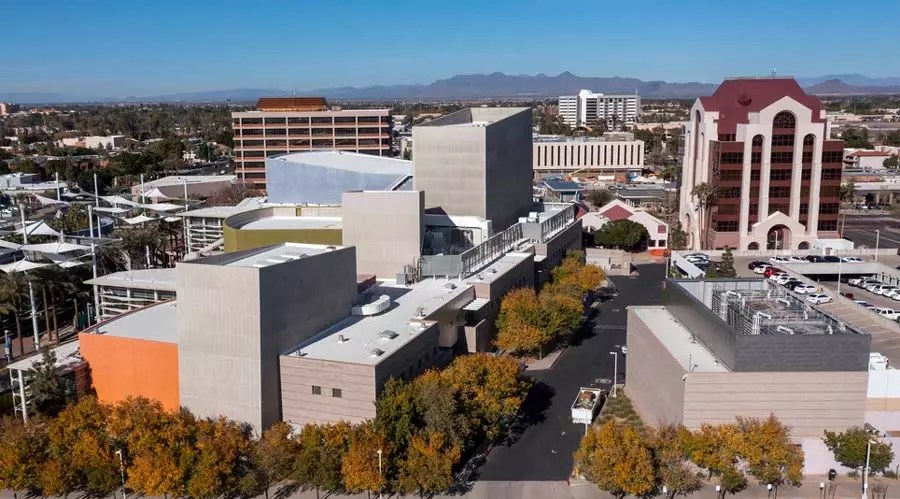Getting Help for Drugs in the Greater Mesa Area
Addiction is a complex and devastating condition that affects millions of people around the world. It’s characterized by compulsive patterns of substance use, despite the potential for significant physical, mental, and social harm. According to the Substance Abuse & Mental Health Services Administration (SAMHSA), more than 46 million people aged 12 or older (or 16.5 percent of the population) met the applicable DSM-5 criteria for having a substance use disorder in the past year.
Despite overwhelming evidence that addiction carries severe risks and has long-term implications for one’s physical and mental health, many people still struggle in silence without seeking treatment due to fear, shame, or stigma associated with having a substance use disorder. Many people in the East Valley may even be unaware of the drug rehab Mesa services that are available to them. That’s why it’s so important for family members and loved ones to provide support for those who may be struggling with addiction and encourage them to obtain professional help if needed.
Keep reading to learn more about addiction and treatment options, as well as what Catalina Behavioral Health can do to help!
24 Hour Drug Rehab Helpline – Call Now!
What Does Drug Rehab Offer?
Drug and alcohol rehab is an important component of the recovery process for individuals struggling with substance abuse and addiction. It can be a life-changing experience that leads to lasting improvements in physical health, mental health, and overall well-being. However, many people are unfamiliar with what drug rehab centers entail, or how they can help them overcome their substance use disorder (SUD), so it’s helpful to learn a little bit about what drug rehab is and what to expect.
Substance abuse or addiction treatment is designed to address all aspects of a person’s substance abuse disorder. Drug rehab typically involves individualized services such as individual therapy, group therapy, educational programs, counseling for trauma resolution, medication management, anger management, relapse prevention planning, case management services, family counseling sessions, and more – all tailored to meet each patient’s unique needs.
There are several types of rehabilitation programs available that specialize in treating specific kinds of SUDs. Inpatient programs involve extended stays at a facility – 30-90 days – where patients receive 24/7 care from medical professionals.
Partial hospitalization programs offer an intermediate level between inpatient and outpatient care requiring individuals to spend up to eight hours per day at the facility for addiction treatment and therapeutic interventions. Intensive outpatient programs or IOPs involve regular visits to a drug and alcohol rehab facility where treatment takes place during the day for a few hours.
What are the Signs of Drug and Alcohol Addiction?

Knowing the effects and signs of drug and alcohol addiction can help you identify if someone you know is struggling with addiction and get them the help they need.
The most common signs of alcohol or drug addiction include changes in behavior, neglecting responsibilities, physical changes, withdrawal symptoms, and cravings for the substance.
People who are addicted to drugs or alcohol may become more isolated from friends and family, have difficulty concentrating or remembering things, show signs of depression or anxiety, or become more reckless. They may also start to neglect their responsibilities at work or school, such as missing deadlines or not showing up for appointments.
Physical signs of drug or alcohol abuse can include red eyes, dilated pupils, changes in weight due to poor nutrition, slurred speech, lack of coordination or balance problems, tremors or shaking hands, and changes in sleeping patterns.
Withdrawal symptoms that occur when a person stops using the substance are also a sign of addiction and can include nausea and vomiting, sweating and chills, insomnia or excessive sleepiness, irritability, and mood swings. Cravings for the substance are also a sign that a person may need help; people may feel an intense urge to use drugs or alcohol even when they know it’s not good for them.
If you suspect someone you know is struggling with an addiction to drugs or alcohol, it’s important to talk to them about it in a non-judgmental way. Let them know that you care about them and want to help them get the treatment they need. There are many resources available to those struggling with substance abuse issues.
Who Needs Drug Rehab Mesa AZ Services?
Rehab is not just for “heavy” drug addicts; it can benefit anyone struggling with any kind of substance abuse dependency, from casual recreational users to full-blown addicts. The type of treatment and level of care needed will depend on the severity of the addiction and the individual’s needs; some patients may require residential treatment for detoxification and inpatient treatment, while others may find an outpatient program more suitable for their lifestyle.
Anyone who is experiencing negative effects from drugs and alcohol should consider rehab as an option for getting clean and starting down the path of recovery.
When Should Someone Go To a Drug and Alcohol Treatment Center?
There is no one-size-fits-all answer when it comes to how soon somebody should go into rehab – it’s different for everyone depending on many factors such as age, the severity of the addiction, and personal choice. Typically, though, the sooner someone with a substance abuse problem gets help, the better their chances of successful recovery in the long run.
For many people facing addiction issues, it can often take hitting “rock bottom” before they fully recognize that they need help. However, this isn’t a requirement. It’s never too soon or too late to seek treatment.
Verify Your Insurance Coverage Confidentially!
Does Insurance Cover Substance Abuse Treatment?
Substance abuse is a serious issue with devastating consequences, and many individuals struggling with addiction need help to find effective recovery. While cost should not be a deciding factor for seeking treatment, it’s important to know whether your insurance covers substance abuse treatment so that you can plan accordingly.
It depends on the individual’s insurance provider and their policy coverage, but most major health insurance companies now provide coverage for some form of drug and alcohol rehab. This includes private health insurance plans and employer-sponsored group plans. Generally speaking, if the patient is covered under an insurance plan that covers addiction services, then they are usually eligible for some level of financial assistance toward their treatment expenses.
If Insurance Doesn’t Cover Substance Abuse Treatment, How Can You Pay For It?
If your health plan does not provide adequate coverage for drug rehab services, there are still options available. Many facilities offer sliding-scale payment plans based on income levels. Others offer scholarship programs and payment plans. Additionally, the Substance Abuse and Mental Health Services Administration sometimes provides grants to help with addiction treatment.
Finding help for someone suffering from addiction issues is essential, and cost should never be an obstacle preventing them from getting proper treatment and starting down the path toward long-term recovery.
Essential Drug Rehab Services

Treatment is an essential step in helping someone struggling with addiction to find effective recovery, but there are many different types of drug treatment options available, making it difficult to decide which one is best for your individual needs. Here is a mere detailed outline of some of the most common forms of drug treatment so that you can make an informed decision about how you want to pursue sobriety.
Detox
Medical detox is the first step for many individuals in overcoming addiction. It involves removing all traces of drugs or alcohol from the body and managing withdrawal symptoms before beginning any sort of formal therapy program. Medication-assisted treatment is often provided in detox centers to help with withdrawal symptoms.
The length and intensity of detox depend on many factors such as age, health history, the severity of addiction, the type of substances being abused, and other personal factors. Detox programs are usually medically supervised and require around-the-clock monitoring.
Inpatient Treatment
Inpatient or residential treatment facilities offer comprehensive care for individuals in need of more intensive treatment programs. These programs typically involve 24/7 medical monitoring, behavioral therapies, group sessions, and other activities designed to help patients break free from addiction and stay clean over time.
Inpatient treatment centers may also offer additional services such as family counseling, nutrition workshops, and recreational activities. They are often seen as a “jumping off point” for individuals looking to start fresh after battling addiction.
Partial Hospitalization Programs (PHP)
PHPs involve intensive treatments similar to those found in inpatient programs but are structured so that patients may continue living at home while attending the therapy sessions on an outpatient basis.
This type of program is ideal for individuals who need more support than what traditional outpatient care offers but don’t require full-time residential care.
Intensive Outpatient Programs (IOP)
IOPs are structured similarly to PHPs but involve fewer hours per week and less intense treatments than residential care provides. These programs typically last between 6-12 weeks, depending on each patient’s individual progress toward sobriety goals set by their doctor or therapist.
Services generally include group counseling sessions, behavioral therapies, psychiatric assessments, medication management (if necessary), relapse prevention education, and 12-step involvement.
Outpatient Care
Outpatient care focuses on providing access to basic services while allowing patients flexibility to lead a normal lifestyle outside of therapy sessions. This includes regular checkups with doctors or therapists along with access to group therapy and individual therapy.
Outpatient care is best suited for individuals who have already completed either an inpatient or partial hospitalization program and can maintain their sobriety outside of a controlled environment without needing extra support from medical professionals throughout the day or night.
Dual Diagnosis Treatment
For individuals diagnosed with both substance abuse issues as well as mental health disorders –known as co-occurring or dual diagnosis disorders – it’s necessary to be engaged in treatment that addresses both of these issues at the same time.
Services typically focus on addressing both conditions through behavior therapeutics such as cognitive behavioral therapy (CBT), dialectical behavior theory (DBT), motivational interviewing techniques (MI), and cognitive restructuring techniques, among others. Medications may also be prescribed if deemed necessary by medical professionals involved in your treatment plan.
What are the Benefits of a Drug Rehab Center?

No matter the severity of your substance use disorder, there are several benefits associated with seeking out drug rehab treatment:
Improved Physical Health: Drug addiction has been linked to numerous physical health problems such as organ damage due to long-term alcohol misuse or liver disease from heavy opioid use. During detoxification, patients often see significant improvements in their physical health simply by abstaining from using drugs or alcohol for an extended period of time.
Improved Mental Health: Addiction often goes hand-in-hand with mental illness—but both issues can be addressed simultaneously through evidence-based therapies such as cognitive behavioral therapy (CBT), which can help identify and change destructive thought patterns while also recognizing triggers that encourage negative behavior surrounding substance use disorders.
Improved Quality Of Life: When someone successfully completes a rehabilitation program they may experience improved self-esteem, better communication skills, increased motivation, and better-coping strategies when faced with difficult situations like stress or anxiety—all positive steps towards living a healthier lifestyle free from substances.
Support Network: Through participating in group meetings or other forms of support groups within drug rehabilitation facilities, recovering addicts can benefit from having access not just to specialists but also to peers who understand their struggles with addiction and provide much-needed encouragement on their journey toward long-term recovery.
Overall, drug rehabilitation provides individuals suffering from substance abuse access to specialized medical care and therapeutic interventions designed to help them overcome their addictions and build healthier lives through recovery.
Licensed Drug Addiction Treatment – Get Options Now!
Get Help Convenient to Mesa AZ and Begin Your Recovery
Located less than two hours away from Mesa, AZ, Catalina Behavioral Health provides the perfect balance between distance and convenience. Clients have an opportunity to find their footing in recovery without the extra pressure of familiar surroundings.
Our clinical team works closely with each client to help them create both short and long-term goals while they stay with us during their residential journey. Our staff takes great pride in building a meaningful therapeutic relationship with all residents and providing an appropriate level of care for each person. We make sure our clients feel seen, heard, and valued throughout their stay. For help with substance misuse and other mental health issues, Catalina Behavioral Health can help.
All calls are confidential, so contact us to discuss your options today!





